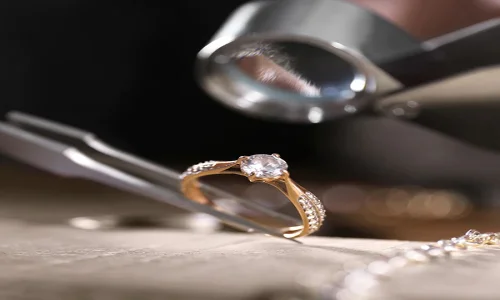Jewelry valuation involves determining the monetary worth of a piece of jewelry, taking into account various factors that contribute to its value. This valuation is essential for insurance, estate planning, selling, or simply understanding the worth of your jewelry collection. Here are some key factors and methods used in jewelry valuation:
Factors Influencing Jewelry Valuation:
Materials Used: Metal: The type and purity of the metal used (e.g., gold, silver, platinum). Gemstones: The type, quality, and size of gemstones significantly impact value.
Gemstone Quality: Color, Cut, Clarity, and Carat (the 4 Cs): These factors are critical in determining the value of gemstones like diamonds.
Designer or Brand: Jewelry from well-known designers or prestigious brands may have higher values.
Age and Rarity: Antique or rare pieces may have increased value due to their scarcity.
Condition: The overall condition of the jewelry, including wear and tear, affects its value.
Hallmarks and Authenticity: Genuine hallmarks and certificates of authenticity contribute to a piece’s value.
Market Trends: Current market trends and demand for specific styles or periods can influence valuations.
Methods of Jewelry Valuation:
Appraisal by a Certified Gemologist or Appraiser: A professional appraiser with gemological expertise can assess the jewelry’s quality and provide an estimated value.
Insurance Appraisal: This type of appraisal is specific to determining the replacement cost for insurance purposes. It considers the cost of replacing the item with a similar one in the current market.
Market Comparisons: Analyzing the prices of similar pieces in the market can provide a benchmark for valuation.
Auction House Estimates: Auction houses often provide estimates based on their expertise and knowledge of market demand.
Online Valuation Tools: Some websites offer online tools to estimate the value of jewelry based on provided information. However, these are usually rough estimates and may not replace a professional appraisal.
Metal and Gemstone Prices: Valuation can be influenced by the current market prices of metals and gemstones.
Historical Sales Data: Reviewing historical sales data for similar pieces can help establish a realistic market value.
It’s important to note that jewelry valuation can vary based on the purpose of the appraisal (e.g., insurance, resale) and the specific characteristics of the piece. Seeking the services of a certified and experienced appraiser is crucial to obtaining an accurate and reliable valuation for your jewelry.






